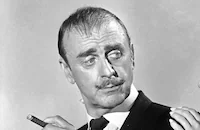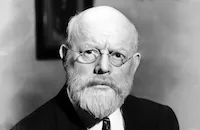Golden Earrings
Brief Synopsis
Cast & Crew
Mitchell Leisen
Ray Milland
Marlene Dietrich
Murvyn Vye
Bruce Lester
Dennis Hoey
Film Details
Technical Specs

Synopsis
In London, in the autumn of 1946, British Major General Ralph Deniston is sitting at his club when he receives a pair of gold earrings in the mail. Later, on an airplane en route to Paris, Ralph is seated next to news correspondent Quentin Reynolds who, like other members of Ralph's club, has been curious about his pierced ears and changed personality since the war. Sensing Reynold's curiosity, Ralph relates how his ears came to be pierced: In 1939, before the war, stuffy British colonel Ralph and his young partner, Byrd, are sent to Germany to procure the secret formula for a poisonous gas from its inventor, German scientist Professor Otto Krosigk, who is friendly with the British. Ralph and Byrd are caught by Nazi soldiers and held captive in a farmhouse. During a radio address by Adolf Hitler, Ralph and Byrd escape and separate, with plans to meet in Freiburg, where Krosigk lives. While making his way through the Black Forest, Ralph is befriended by a gypsy named Lydia, who transforms him into a gypsy for his protection. Ralph resists her attempts to make a true gypsy of him, but cooperates out of self-preservation. Eventually, they arrive at the camp of Lydia's clan, near Freiburg. There, Ralph fights Zoltan, the gypsy king and Lydia's ex-lover, in order to win her. After defeating Zoltan, Ralph is welcomed into the clan, and befriended by Zoltan. Still disquised as a gypsy, Ralph meets up with Byrd, and, trying to avert suspicion, pretends to read his fortune, but is stunned when he foresees Byrd's death. When Byrd is gunned down by Nazi soldiers, Ralph shoots his killers, and the gypsies bury Byrd in the forest. To ensure his safety, Lydia and Zoltan insist on accompanying Ralph to a Nazi party gathering at Krosigk's house, where they read fortunes to amuse the guests. By the time they arrive and Ralph convinces Krosigk of his identity, however, the Nazis have forbidden anyone to leave, except the gypsies, whom they throw out. As they leave, Krosigk surreptitiously hands Ralph the formula on a note that is meant as payment for having had his fortune told. Ralph and Lydia arrive safely at the French border and swear their love. After returning Lydia's earrings, Ralph promises to meet her at the same spot after the war, which she waits out in Switzerland. After Ralph finishes his story, the plane lands, and Ralph returns to the wooded spot where he and Lydia said goodbye and dons the earrings before embracing her.

Director

Mitchell Leisen
Cast

Ray Milland

Marlene Dietrich

Murvyn Vye
Bruce Lester
Dennis Hoey
Quentin Reynolds
Reinhold Schunzel
Ivan Triesault
Hermine Sterler
Eric Feldary
Fred Nurney
Otto Reichow
Gisela Werbiseck
Larry Simms
Haldor De Becker
Gordon Richards
Vernon Downing
Leslie Denison
Tony Ellis
Gwen Davies
Robert Cory
Hans Von Morhart
Henry Rowland
William Yetter Sr.
Henry Guttman
Roberta Jonay
William Yetter Jr.
Leo Schlesinger
Jon Gilbreath
James W. Horne
Carmen Beretta
Frank Johnson
Mme. Louise Colombet
Maynard Holmes
Fred Giermann
Harry Anderson
Caryl Lincoln
Robert Val
Gordon Arnold
Pepito Perez
George Sorel
Hans Schumm
Martha Bamattre
Antonia Morales
Jack Wilson
Charles Bates

John Dehner

Howard Mitchell
Arno Frey
John Good
Jack Worth
Walter Rode
Peter Seal
John Peters
Al Winters
Greta Ullman
Catherine Savitsky
Bob Stephenson
Henry Vroom
Ellen Baer
Margaret Farrell
Crew
Phil Boutelje
Frank Butler
Sam Comer
Johnny Coonan
Billy Daniels
Helen Deutsch
Mary Kay Dodson
Hans Dreier
Farciot Edouart
Ray Evans
Daniel L. Fapp
Dr. Ernest Golm
Grace Gregory
Mme. Hilda Grenier
Gordon Jennings
Mitchell Leisen
Jay Livingston
Alma Macrorie
Don Mckay
John Meehan
Walter Oberst
Abraham Polonsky
Ed Ralph
Harry Tugend
Wally Westmore
Victor Young
Victor Young

Film Details
Technical Specs

Articles
Golden Earrings
When director Mitchell Leisen first took on Yolanda Foldes' best seller about a gypsy woman who helps a downed British flyer hide from Nazi soldiers by disguising him as her gypsy lover, he knew he had to have Dietrich as his leading lady. He and his agent, Charles Feldman - who also represented Dietrich - had their work cut out for them convincing Paramount's executives to welcome back their one-time star. They finally argued that she was the only actress who could maintain her glamour while dressed in the gypsy's rags. They also suggested that audiences would welcome her back to the screen after her years of work with the USO during World War II.
Filming started while Dietrich was still in France, where she was engaged in a torrid affair with a French Army general. So the studio started with long shots of an escape sequence in which a stunt woman ran over hills and fallen logs clad in the Hollywood version of gypsy garb - complete with decidedly inauthentic spike heels. Meanwhile, Dietrich was researching gypsy life in the camps along the Seine. When she got to the set, she brought an authentic costume with her and insisted on playing the role barefoot. Paramount didn't want to pay to re-shoot the escape scene, so the close-ups of Dietrich show her in a different costume than in the long shots.
In addition to letting her dictate the character's wardrobe, Leisen also let her do her own makeup (Dietrich was the only Hollywood star who also belonged to the makeup artists' union) and light her own scenes. This did not go over well with Milland, who feared she would use her control to steal the picture from him.
Milland had not wanted to do the film, claiming the story was ridiculously lightweight for an actor who had just won an Oscar for playing the alcoholic writer in The Lost Weekend (1945). He also said that Dietrich, only two years his senior, was too old to be his love interest. For her part, she complained that he had body odor and was a lousy actor. In private, she even suggested that he'd gotten the part because Leisen, whose homosexuality was well-known throughout Hollywood, was attracted to him. This was a particularly nasty joke on Milland, who was one of the screen's most notorious homophobes and eventually refused to work with Leisen for fear that he might, indeed, make a pass at him.
On the set, Dietrich delighted in shocking Milland. For one scene by the campfire, she pulled a fish head out of her cauldron, popped it in her mouth, sucked out the eyes, then pulled the fish head back out. When Leisen called cut, she then stuck her finger down her throat so she could throw up the fish eyes. She did this in repeated takes, as Milland grew paler and paler under his gypsy makeup. In another scene she reached under her skirt to scratch for lice, then offered Milland some bread with the same hand.
Yet she was also the complete trouper. Her cauldron was actually only lukewarm, but bubbled and steamed thanks to some dry ice in the bottom. One day when they went to lunch, the props people forgot to put out the fire under the kettle. When they returned, the water really was boiling, which Dietrich found out when she reached into it. But even though she had second degree burns, she insisted on finishing the scene, even reaching into the cooled off cauldron with her injured hand.
Although the critics were not kind to Golden Earrings, it fared well at the box office, returning almost seven times its cost to the studio. The film's popularity was helped tremendously by its hit title song, which spent 14 weeks on the Hit Parade, and some free publicity by the Catholic Church's Legion of Decency, which condemned the film for showing Dietrich and Milland living together without benefit of wedlock. But the biggest draw was Dietrich herself. Milland and Leisen had both been right: she had used her witty turn as the gypsy to steal the film, and audience's were indeed eager to see the woman they thought had helped win the war. Top-billed Milland was none too happy to see the film's ad campaign focus almost entirely on his leading lady, with posters announcing "Dietrich's Back!" But after Golden Earrings became a hit, nobody could deny that the screen's most glamorous German was back and back to stay.
Producer: Harry Tugend Director: Mitchell Leisen
Screenplay: Frank Butler, Helen Deutsch, Abraham Polonsky
Based on the novel by Yolanda Foldes
Cinematography: Daniel L. Fapp
Art Direction: Hans Dreier, John Meehan
Music: Victor Young
Cast: Ray Milland (Colonel Ralph Denistoun), Marlene Dietrich (Lydia), Murvyn Vye (Zoltan), Bruce Lester (Richard Byrd), Dennis Hoey (Hoff), Reinhold Schunzel (Professor Otto Krosigk), Ivan Triesault (Major Reimann).
BW-95m.
By Frank Miller

Golden Earrings
Quotes
Trivia
Notes
This film marked Marlene Dietrich's return to the American screen after three years spent entertaining American soldiers overseas. In 1946, she appeared in a French film with Jean Gabin called Martin Roumagnac. According to Paramount press releases, Dietrich learned the cymbalom, or Hungarian zither, in order to accompany her singing in the film. In addition, her hair was dyed black and her skin made to appear darker for the film. As noted in Hollywood Reporter, costumer Mary Kay Dodson collected three-hundred old European coins from Hollywood antique shops for one of Dietrich's costumes. According to modern sources, although Abraham Polonsky received a co-writer credit, none of his screenplay was used in the final film. The Black Forest scenes were shot around Portland and Bend, OR in July 1946. The film marked the motion picture debut of actor Mervyn Vye. Quentin Reynolds, who appears as himself in the film, was a prominent news correspondent.














